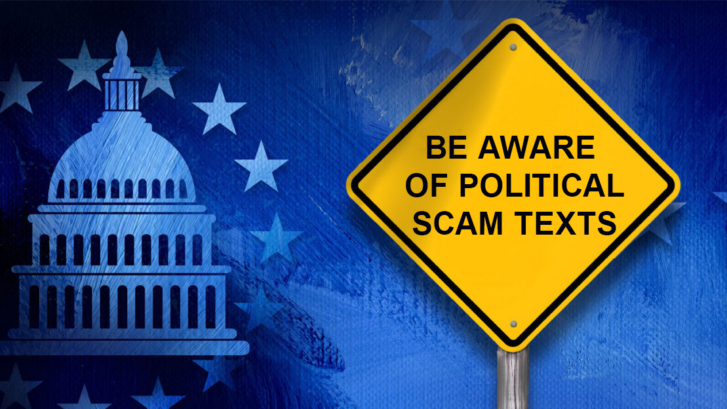As the 2024 election between Kamala Harris and Donald Trump intensifies, political text messages are becoming a common (and often unwelcome) part of daily life for many Americans. While some texts provide important information, others are merely spam, scams, or outright nuisances.
In this article, we’ll guide you through the steps to identify unwanted political texts and show you how to stop them. Whether you’re tired of being bombarded by campaign messages or concerned about potential scams, these tips will help you take control of your text messages.
Understanding Political Texts: The Good, the Bad, and the Ugly
Political texts come in many forms, from legitimate campaign updates to unwanted spam. Understanding the different types of political texts can help you decide how to handle each one.
- Legitimate Political Texts:
- These texts are sent by official campaigns, political parties, or advocacy groups. They usually provide information on voting dates, campaign events, or solicit donations. Legitimate texts often include clear opt-out options like replying “STOP.”
- Unwanted but Legitimate Texts:
- These messages are legal but may not be welcome. For example, if you’ve signed up for updates from a political campaign in the past, you might still be on their list, even if you’re no longer interested. While these texts aren’t scams, they can still be annoying.
- Political Spam:
- Political spam includes unsolicited messages that often lack a clear sender or opt-out option. These messages may come from unknown numbers and often feel intrusive.
- Political Scam Texts:
Download YouMail and instantly stop spam calls, texts, and voicemail.
How to Identify Unwanted Political Texts
Identifying whether a political text is unwanted or potentially harmful involves looking out for certain red flags:
- Check the Sender:
- Legitimate political texts usually come from a recognizable number or short code. If the sender is a random number, or if you don’t recognize the name or organization, it’s worth being cautious.
- Look for Opt-Out Options:
- Federal regulations require legitimate political texts to include an easy way to opt-out, usually by replying “STOP.” If a message lacks this feature, it might be spam or a scam.
- Analyze the Language:
- Be wary of messages that use fear-mongering, urgent calls to action, or overly aggressive language. Scammers often use these tactics to pressure you into acting without thinking.
- Suspicious Links:
- Avoid clicking on links in messages unless you’re sure of their legitimacy. Scammers often use shortened or unfamiliar URLs to hide their true destination.
- Verify with the Campaign:
- If you’re unsure about a message, visit the campaign’s official website or contact them directly to confirm whether the text is legitimate.
Steps to Stop Unwanted Political Texts
If you’re fed up with political texts cluttering your inbox, there are several steps you can take to reduce or eliminate them:
- Opt-Out of Political Texts:
- For legitimate campaign messages, the simplest way to stop receiving texts is to reply with “STOP.” This should remove you from their list, although it might take a few days for the change to take effect.
- Block the Sender:
- Most smartphones allow you to block numbers directly from your messaging app. Blocking the sender prevents them from contacting you again, though it won’t stop new numbers from reaching you.
- Use Spam-Blocking Apps:
- Apps like YouMail can help you filter out unwanted texts by identifying and blocking known spam numbers. These apps often include advanced features to help you manage who can contact you.
- Register with the National Do Not Call Registry:
- While the Do Not Call Registry is primarily for phone calls, it can also reduce the number of unsolicited texts you receive. Although political texts are generally exempt, being on the registry might still help reduce overall spam.
- Report Spam Texts:
- If you receive a text that you believe is spam or a scam, you can report it by forwarding the message to 7726 (SPAM). Your carrier will investigate and may block future messages from that number.
- Contact Your Wireless Carrier:
- Some carriers offer additional tools and services to block unwanted texts. Contact your carrier to see what options are available, such as premium spam protection plans.
- Be Careful with Your Phone Number:
- One of the best ways to prevent unwanted texts is to limit who has access to your phone number. Be cautious about where you share your number, especially online or in public directories.
Tips for Staying Safe from Political Text Scams
Beyond just stopping unwanted texts, it’s crucial to stay safe from political scams that could harm your personal security. Here’s how:
- Never Share Personal Information:
- Legitimate campaigns will never ask for sensitive personal information like your Social Security number, bank details, or passwords via text. If a message asks for this information, it’s a scam.
- Don’t Click on Unverified Links:
- If you’re unsure about a link in a text message, don’t click on it. Instead, go directly to the campaign’s official website through your browser to find the information you need.
- Educate Yourself on Common Scams:
- Familiarize yourself with the common tactics used by scammers during election season. This can include fake donation requests, misinformation about voting, or messages impersonating candidates.
- Monitor Your Accounts:
- If you’ve clicked on a suspicious link or provided information in response to a text, monitor your bank accounts and credit reports closely for any unusual activity.
- Update Your Phone’s Security Settings:
- Ensure that your phone’s operating system and apps are up to date. These updates often include security patches that can protect you from vulnerabilities exploited by scammers.
- Consider Two-Factor Authentication:
- Enable two-factor authentication on your important accounts. This adds an extra layer of security and makes it harder for scammers to gain access to your information.
The Role of Regulations and Future Trends
While individual actions can help reduce unwanted political texts, broader regulatory changes are also needed to address this growing issue. Here’s what might be on the horizon:
- Stricter Regulations:
- As the volume of political texts continues to grow, there’s increasing pressure on regulators to introduce stricter rules around consent and transparency. This could include requiring explicit opt-in for political texts and enforcing clearer disclosure of who is behind each message.
- Enhanced Carrier Controls:
- Wireless carriers are likely to develop more sophisticated tools to help customers manage unwanted texts, including more effective filtering options and stronger protections against spoofing.
- Increased Awareness:
- Public awareness campaigns by organizations like the FCC could help educate voters on how to protect themselves from unwanted texts and scams, reducing the overall impact of these messages.
More on Political texts
- The Rise of Political Texts in the 2024 Election: What You Need to Know
- How to Spot Political Text Scams Like a Pro
- Political Robocalls
- Political Spam Donation Call
- Political Robocall Season
- Political Spam Call Season
See where your phone number, address, or other info is exposed – in seconds.
🔒 Your info will remain private and secure.
Conclusion
As the 2024 election heats up, managing unwanted political texts is becoming a crucial part of maintaining your peace of mind. By learning how to identify these texts and taking proactive steps to stop them, you can keep your inbox clear and stay focused on what really matters.
Whether it’s blocking spam numbers, reporting scams, or simply opting out of campaign messages, you have the tools to take control. Remember, staying informed and cautious is the best defense against the flood of political texts that are sure to continue as Election Day approaches.
Thank you for reading our series on political texts. Be sure to tell us your experience with political texts in the comments below!






It’s hard to tell if they’re legitimate or shady, especially with all the pollsters now using text messages. I think the best thing to do is to simply block them.